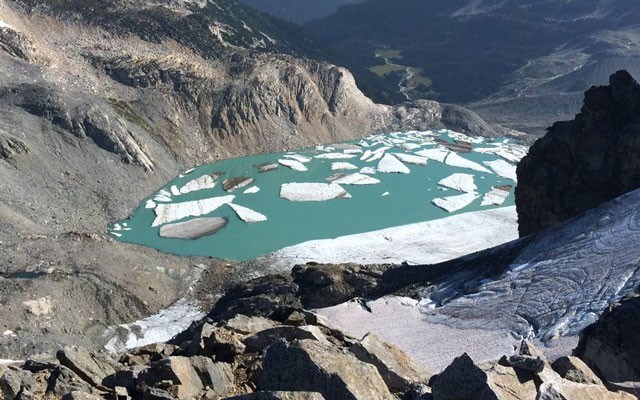Many of Western Canada's glaciers could be gone completely by the end of the century, according to a new study, but those in the Whistler area may survive.
The study — titled "Projected Deglaciation of Western Canada in the 21st Century" and published in Nature Geoscience — used 3-D simulations to examine the potential impact of glacier melt over the next 100 years.
"They make the point that the most vulnerable glaciers are those in the more continental parts of the province, particularly in the southeast corner, the Rocky Mountains," said John Clague, professor of Earth Sciences at Simon Fraser University and an Emeritus Scientist of the Geological Survey of Canada.
"If you look at the data their projection is there will be a lot of ice loss even in the coastal mountains as well, but that the larger glaciers will survive in a reduced state."
According to the study, potential implications of deglaciation include "impacts on aquatic ecosystems, agriculture, forestry, alpine tourism and water quality."
The biggest impacts to Whistler would likely be in the area of recreation, Clague said.
"I'm not sure that water supply would be a huge issue, but recreation would be," he said.
"You have glaciers that are accessible to tourists, and they would be much reduced or the smaller ones would be (gone)... so for example, a tourist who would walk up to Black Tusk would see quite a different landscape."
The authors of the study are some of the leading scientists in their field, Clague said.
"I have quite a lot of confidence in what they've developed and run," he said.
"I think it's a very solid piece of science."
The study uses 21st-century climate scenarios to plot four possible courses for deglaciation. The variables are based in part on how much action humans take to prevent climate change in the next 50 to 100 years.
"They utilize a number of scenarios, just to kind of put bounds on the possible amount of the total ice loss," Clague said.
"So they have a worst-case scenario where we don't really do much — business as usual — and they have other scenarios where we kind of transform our behaviour and adopt more renewable sources of energy over different time frames."
With a certain amount of change to human behaviour in the coming decades, the worst-case scenario could be averted, Clague said.
"It's an interesting blend of physical science and the uncertainties about human behaviour," Clague said of the study.
"The bottom line if you read that report (is) there's a range of possibilities that a physical scientist, a glaciologist, cannot quantify or cannot predict, because human behaviour on this sort of time scale remains unknown."
The other bottom line is one scientists have been talking about for years — humans will need to adapt to the Earth's changing climate.
"I think a point that the authors made — and certainly that's been made by atmospheric scientists — is we're going to have to adapt to a changed climate," Clague said.
"Agriculture, water supply, hydro electric energy production, all of those are big issues, but maybe not quite to the same extent in the Whistler area.
"But the recreational issue is the big one, I think, in Whistler."




